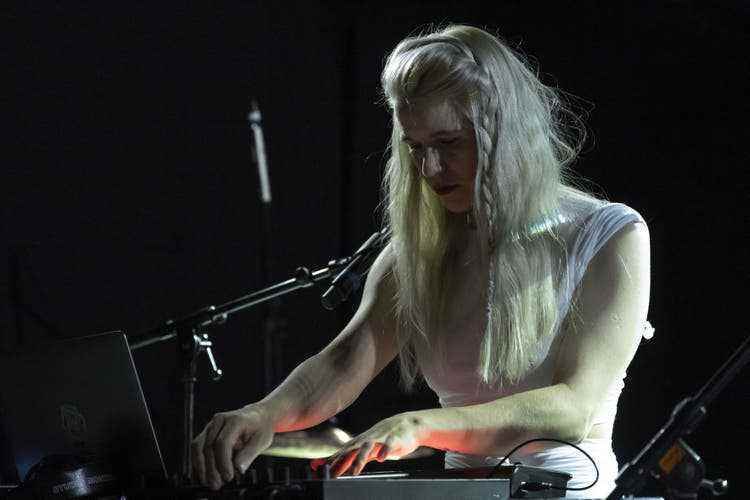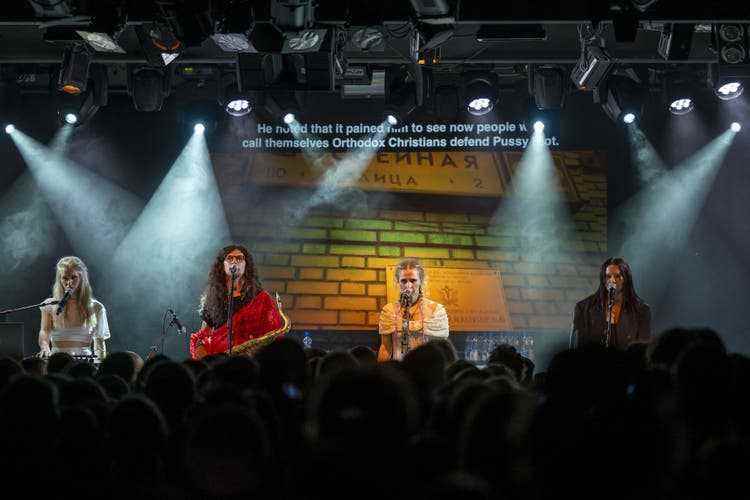For years, the Russian punk formation has been leading artists and musicians against the Putin regime. With their multimedia concerts they celebrate an aesthetic of resistance.
Mary Alyokhina’s face is hidden behind the yellow balaclava.
Who or what is Pussy Riot? “Pussy is dead” can be read in older Internet posts; “Everybody can be Pussy Riot”, on the other hand, is written on T-shirts that are sold in the “Kaserne” Basel, where Pussy Riot is on the program on Tuesday evening. When the Russian punk band performs, you expect fearless women who hide their identities under colorful balaclavas and stage themselves against Vladimir Putin with noisy music and pointed slogans, singing, cursing, screaming.
Like in 2012, when four or five activists with a guitar, bass and a film team broke into the Christ the Savior Cathedral in Moscow to ask Mary the Mother of God in a so-called punk prayer to put the president in his place. The fact that the ice-cold power man served himself to the church before the elections to obtain a divine blessing for his reign was just as disgraceful to the Pussy Riot activists as the opportunism of the orthodox church, which allowed itself to be harnessed to the despotic strategist’s purposes. Alone, the musicians finally had to pay for their action with hard camp imprisonment.
Branded balaclava
On Tuesday evening, the beats rattle shrill and poisonous through the sold-out Basel concert hall. A saxophonist seems to noisily squeeze all the sorrows of this world out of his horn. And then two women in balaclavas – one yellow, the other blue and violet – storm onto the stage to shout anti-Putin slogans at the audience.

Diana Burkot is also a longtime member of Pussy Riot.
Even before the performance begins, however, the band’s manager has already stepped in front of the audience to announce the artists. That may be unusual for a punk concert. Its introduction has at least provided some clarity regarding the former and current line-up of the punk collective.
Diana Burkot, who is currently operating the sequencer, pounding the drums and occasionally singing religious refrains ironically, was already involved in the action in the Christ-Erwerder-Kirche, but was able to remain unrecognized. Olga Borisova, on the other hand, a former policewoman, is in the new line-up as vocalist and lyricist Marija Alyokhina, the band leader, so to speak.
Alyokhina had to serve a nearly two-year prison sentence for the punk prayer – together with Nadia Tolokonnikova, a co-founder of the group, which emerged from the Voina artist collective in 2011. Meanwhile, Tolokonnikova mostly lives in the USA, where she tries to conquer the pop scene under the brand Pussy Riot. Today, Tolokonnikova and Alyokhina are united only by the shared band name and their experiences in camps, both of which have recorded in their own book. The punk performance with which the group is currently on tour is also based on Alyokhina’s writing “Riot Days”.
The punk performance with which the group is currently on tour is also based on Alyokhina’s writing “Riot Days”.
In May, the artist managed a spectacular escape to the west via Belarus; she had disguised herself as a food delivery woman. In Russia she would have had to spend a few more days behind bars (as punishment for taking part in a rally for dissident Alexei Navalny). But she did not flee out of fear of imprisonment – she was used to that for a long time, the manager said. Rather, she absolutely wanted to take on the international obligations of her band.
In fact, Marija Alyokhina appears on the Basel stage as the embodiment of will and anger. With long pigtails and a beige dress, she is more reminiscent of a demure peasant woman than a clichéd punk. But appearance is deceptive. With and without a balaclava she convinces as an agitator.

Pussy Riot in the Basel barracks: Diana Burkot, Anton Ponomarev, Marija Alyokhina and Olga Borisova (from left to right)
If you sometimes miss commitment and urgency in contemporary pop music today, Pussy Riot will literally overwhelm you with the aesthetics of resistance. The artists draw an irrepressible power from the contempt and hatred of the regime, which is channeled through techno and punk rhythms and clocked through loud, strict, whipping chants by Borisova and Alyokhina.
There is no such thing as punk pessimism à la “no future” in Aljochina’s Pussy Riot, just like mere entertainment. Rather, their performance can be understood as a revolution fair. In a kind of rap reenactment, the group rolls up the events surrounding the punk prayer of 2012 chapter by chapter – from the conspiracy of the activists, the secret training to the heroic crime to the arrest, the trial and imprisonment. At the same time, the events in the background are brought to life through videos with which the band has documented their history well. The performance is also supplemented by revolutionary slogans and merciless Putin bashing (at some point someone urinates on a picture of Putin).
Fight for freedom
The uprising of the Russian women lasted a good hour. There is hardly any dynamic. The subversion machine is always running at full steam. Finally, Alyokhina addresses the audience directly: Are you ready to stand up for freedom every day? The question is projected onto a screen. Of course, one would like to answer. However, one feels so exhausted by noise and rhythm, by langue and parole, as if one had been plagued with tear gas and shot at with rubber bullets. Ultimately, however, one has to admit: If Putin could be defeated with punk, Pussy Riot would free the world from Russian tyrants.
